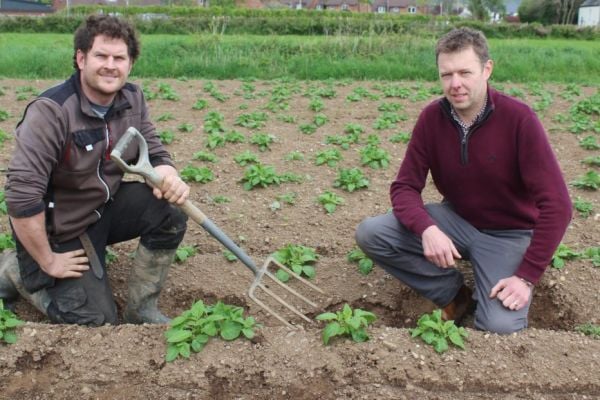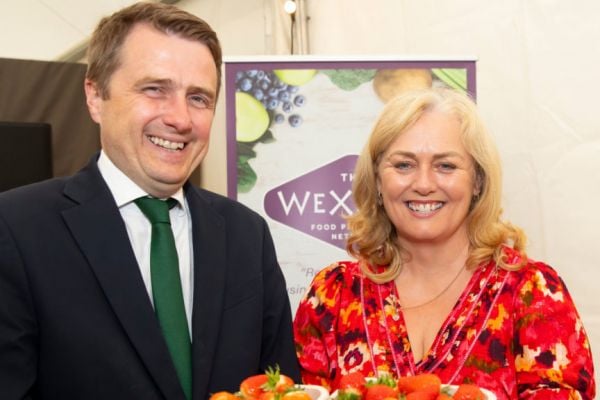Most shoppers are happy with the fresh produce ranges and special offers available in-store. Fresh produce is very important to Irish consumers, as is buying in-season fruit & veg – and they don’t appear to be switching to meat/dairy alternatives. These are some of the findings of research conducted by Bounce Insights on behalf of Checkout.
The research was conducted on 27 February 2023.
It targeted a nationally representative sample of 500 respondents across Ireland who were asked various questions relating to their fresh produce consumption and purchasing behaviours.
The research revealed that the top five most popular fruit/vegetables that are purchased regularly are potatoes, bananas, onions, carrots and apples, with 76.75% of respondents agreeing that buying fruit/ vegetables that are in-season is important to them compared to 5.28% of respondents who disagree.
52.54% of respondents regularly purchase fish as part of their weekly shop whereas 24.61% of respondents don’t.
A large proportion of respondents disagreed with the statement that they ‘have been replacing meat with plant-based alternatives over the past year’ (57.61%).
A large proportion of respondents also disagreed with the statement that they ‘have been purchasing dairy alternatives to replace cheese, butter, milk’ (58.40%).
While 77.54% of respondents are happy with the fresh produce ranges and special offers available in their local supermarkets, 10.94% of respondents are neither happy/unhappy, and 11.53% are unhappy.
The Results
Question One: What fruit and vegetables do you typically buy as part of your regular grocery shop? Please select all that apply.
The top five most popular fruit/vegetables to purchase regularly are:
• Potatoes (73.24%)
• Bananas (72.85%)
• Onions (72.66%)
• Carrots (72.66%)
• Apples (68.95%).
The three least popular fruit/vegetables to purchase regularly are:
• Avocado (25.78%)
• Sweet potato (25.98%)
• Spinach (30.08%).
Analysing this across the various demographics, there are no great deviations between genders while purchasing fruit or vegetables.
In terms of age, 18-24-year olds are a lot less likely to buy sweet potatoes regularly and 35-44-year olds are a lot more likely to buy spinach regularly.
Question Two: Please select if you agree/disagree with the following statement: Buying fruit/vegetables that are in-season is important to me!
• 39.84% of respondents strongly agree
• 36.91% of respondents somewhat agree
• 17.97% of respondents neither agree/disagree
• 3.52% of respondents somewhat disagree
• 1.76% of respondents strongly disagree.
76.75% of respondents ‘agree’ that buying fruit/vegetables that are in-season is important to them in comparison to 5.28% of respondents who ‘disagree’.
Of the respondents who ‘strongly agree’, 55.39% of those are male, and of the respondents who ‘strongly disagree’, 77.78% of those are female.
Question Three: How often would fish be a part of your weekly shop?
• 26.76% of respondents always buy fish
• 25.78% of respondents often buy fish
• 22.85% of respondents sometimes buy fish
• 15.04% of respondents rarely buy fish
• 9.57% of respondents never buy fish.
52.54% of respondents regularly purchase fish as part of their weekly shop, whereas 24.61% of respondents don’t regularly purchase fish as part of their weekly shop.
Of the people who ‘never’ purchase fish as part of their weekly shop, 20.41% are in the 18-24 age group and 32.65% are in the 25-34 age group.
This indicates that young people are less likely to purchase fish weekly in comparison to older generations.
Of the participants who selected that they ‘always’ purchase fish as part of their weekly shop, 56.20% are male, and of the people who never purchase fish as part of their weekly shop, 61.22% are female.
Question Four: Thinking about replacing food items with other alternatives? Analyse these two statements and select if you agree/disagree with the following:
I have been replacing meat with plant-based alternatives over the past year.
• 5.86% of respondents strongly agree
• 21.68% of respondents somewhat agree
• 14.84% of respondents neither agree/disagree
• 27.73% of respondents somewhat disagree
• 29.88% of respondents strongly disagree
I have been purchasing dairy alternatives to replace cheese, butter, milk.
• 6.84% of respondents strongly agree
• 19.73% of respondents somewhat agree
• 15.04% of respondents neither agree/disagree
• 27.15% of respondents somewhat disagree
• 31.25% of respondents strongly disagree.
A large proportion of respondents ‘disagree’ with the statement that they ‘Have been replacing meat with plant-based alternatives over the past year’ (57.61%).
There are no great deviations in responses when comparing gender.
However, looking at age, of those who are in the 45-54 age group, 35.51% ‘strongly disagree,’ and of those who are in the 55-64 age group, 38.51% ‘strongly disagree’.
This reveals the loyalty of older cohorts of shoppers to meat and that there is less of a willingness among shoppers in these age groups to switch to plant-based alternatives.
Similarly, a large proportion of respondents also ‘disagree’ with this statement that they ‘Have been purchasing dairy alternatives to replace cheese, butter, milk’ (58.40%).
Also, similar to the previous statement, there are no large differences in gender.
However, when comparing age, 45.45% of 18-24-year olds ‘strongly agree/somewhat agree’ that they have been purchasing dairy alternatives.
Similar to the pattern of responses to the first statement, older generations are not as likely to switch.
65.42% of 45-54-year olds ‘strongly disagree/somewhat disagree’ that they have been replacing dairy products with alternatives and 64.09% of 55-64-year olds also ‘strongly disagree/somewhat disagree’ that they have been replacing dairy products.
Here we see a clear difference between younger and older demographics and their purchasing habits.
Question Five: How happy/unhappy are you with the fresh produce ranges and special offers that are available in your local supermarket?
• 30.47% of respondents are very happy
• 47.07% of respondents are somewhat happy
• 10.94% of respondents are neither happy/unhappy
• 9.38% of respondents are somewhat unhappy
• 2.15% of respondents are very unhappy
77.54% of respondents are ‘happy’ with the fresh produce ranges and special offers available in their local supermarkets, 10.94% of respondents are ‘neither happy/unhappy’ and 11.53% are ‘unhappy’.
Of the people who are ‘unhappy’, the majority of them are female.
Of the people who are ‘somewhat unhappy’, 60.42% are female, and of the people who are ‘very unhappy’, 81.82% are female.
Looking at age, the 35-44 age bracket are the most ‘unhappy’ with the fresh produce ranges and special offers available in their local supermarket.
35.42% of the respondents who are ‘somewhat unhappy’ are also in the 35-44 age bracket and 45.45% of those who are ‘very unhappy’ are in the 35-44 age group.
Summary Of Findings
Based on the responses to this survey, fresh produce is very important to Irish consumers, and the variety of fruit and vegetables that people are purchasing can be seen in the results.
Also, it is clear that buying in-season fruit and vegetables is very important to consumers, with a large majority (76.25%) classing it as so.
Consumers don’t appear to be switching to meat/dairy alternatives and, although it is more popular in younger cohorts, the older shoppers remain loyal to their meat and dairy purchasing.
The majority of shoppers are happy with the fresh produce ranges and special offers available, although some shoppers believe that there is room for improvement when it comes to the product ranges and special offers in-store.
Interested in receiving insights like these yourself? Try out Bounce Insights today!

© 2023 Checkout – your source for the latest Irish retail news. Article by Maev Martin. Click subscribe to sign up for the Checkout print edition.









